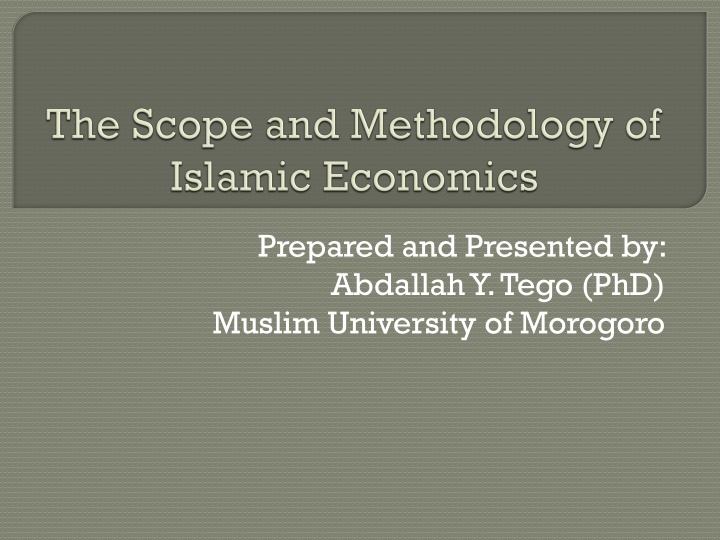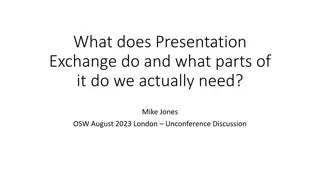
Islamic Economics and Finance: Transforming the Global Financial Landscape
Explore how Islamic finance is reshaping the global financial industry, with a focus on the principles of Islamic economics, banking practices, and the emergence of Islamic financial services in Tanzania. Learn about the integration of Islamic values in financial transactions and the growth of Islamic microeconomics in modern societies.
Download Presentation

Please find below an Image/Link to download the presentation.
The content on the website is provided AS IS for your information and personal use only. It may not be sold, licensed, or shared on other websites without obtaining consent from the author. If you encounter any issues during the download, it is possible that the publisher has removed the file from their server.
You are allowed to download the files provided on this website for personal or commercial use, subject to the condition that they are used lawfully. All files are the property of their respective owners.
The content on the website is provided AS IS for your information and personal use only. It may not be sold, licensed, or shared on other websites without obtaining consent from the author.
E N D
Presentation Transcript
Prepared and Presented by: Abdallah Y. Tego (PhD) Muslim University of Morogoro
The Islamic financial landscape has now been transformed with more diverse players. The sector has now drawn significant participation by Muslims and non- Muslims. Therefore emerged as among the fastest growing segment in the international services industry.
Islamic finance in Tanzania has started with the introduction of Islamic banking business. Currently there are four conventional commercial banks namely; KCB-T, NBC,PBZ, and CRDB, and one fully- fledged Islamic bank; Amana, that are offering Islamic banking services.
Fundamental to Islamic finance is the requirement that financial transactions must be linked to the objective and philosophical foundation of Islamic economics. Islamic economics is about partnership and aimed at poverty alleviation. Islamic economics is defined as the study of how scarce resources are allocated and distributed in conformity with Islamic values and ethos.
Islamic economics emerged as a reflection of a desire to understand economic issues and problems of the Muslim world and arrive at potential solution that suit modern Islamic societies.
It is against this background, the objective and philosophical foundation of Islamic economics must be linked to the Islamic banking business. This presentation has focused on the scope and methodology of Islamic economics in a bid to assist stakeholders in the educational establishment.
Traditionally, economics is classified into microeconomics and macroeconomics. Microeconomics studies the behavior of individual economic agents. Islamic microeconomics studies the economic behavior of these economics agents and their economic decision- making process.
Macroeconomics is chiefly concerned with the behavior of the entire economy and analysis on how the economy performs. It focuses on the aggregate dimensions in the economy such as national income, total money supply and trade balance. From an Islamic perspective, the definition of macroeconomics remains the same as explained above. However, differences may be noticed in the objectives of the economy against which the performance of the economy is studied.
At macro level, Islamic economy is geared to achieve economic well-being including guaranteeing everyone in the economy the basic needs of life, what is economic development, how economic growth is measured etc.
Methodology is generally defined as a system of broad principles or rules from which specific methods or procedures may be derived to interpret or solve different problems within the scope of a discipline. Therefore, economic issues and topics must be discussed and analyzed by following certain rules or principles.
An Islamic economist has to acquire the knowledge of Qur-an and Sunnah of the Prophet (s.a.w) and learn how these primary sources applied to economics. An Islamic economist with the general textual knowledge of Sharia h, must grasp the various economic concepts embedded in the Qur an and Sunnah of the Prophet (s.a.w) and apply them in the modern economic understanding.
For example, the term Israf which may be defined as the extension of consumption level beyond necessary can be equated to explain the relationship between saving and consumption in the modern context. The word Tabzir which is defined as the wastage of economic resources can also be related to economics to explain the need of avoiding wastage of valuable resources.
An Islamic economist must be well versed in the knowledge and application of various fiqh rules relating to economics. Both parts of economics, microeconomics and macroeconomics contain elements of positive economics and normative economics.
Positive economics concentrates on facts and cause-and-effect relationships. It includes theory development and theory testing through scientific based analysis. Normative economics incorporates value judgments about what the economy should be like or what particular policy actions should be recommended to achieve a desirable goal.
Positive economics is related to theoretical part of economics the domain that the Qur an and Sunnah do not directly discuss due to the nature of theory aspect. Ijtihad is the most relevant tool of analysis for theoretical economics.
Normative economics is related to value- based policy issues that in Islam determined and established. In this case, Qur an and Sunnah of the Prophet (s.a.w) serve as the governing principles. While Ijtihad remains secondary source by merely interpreting the primary sources of Shariah, the Qur an and Sunnah of the Prophet (s.a.w).
A Muslim economist must able to examine and analyze available knowledge of economics to find out more accurate facts on the nature of relationship between economic variables as discussed by previous scholars. For example, Ibn Khaldun (1332-1404 AD) provided positive analysis of the effect of tax on work force. According to him, work efforts will be affected by high taxes resulting in a decrease in production and population which will eventually decrease tax revenue by decreasing tax base.
Abu Bakr al-Tartusi (450 AH), another Muslim scholar who introduced the concept of the ability to pay in the principle of taxation, insisting that tax should be imposed only on the surplus income after meeting all the basic needs.
Economics is built up with hypotheses, theories and principles through which potential solution can be reached. Mastery of various economic theories and concepts is key and necessary qualification for being able to integrate economics into Islamic economics settings. Some theories of conventional economics can be analyzed in the light of Islamic values, e.g. the study of consumer behavior, theory of firm, price determination, money market, etc.
Assumption Consumer behavior is based on economic rationalism and fear of Allah. Utility derived from worldly and heavenly consumption. Strictly consider legal (halal) and illegal (haram) in consumption. He only consumes useful while avoids harmful goods. He can control his wants as well as demand.
A Muslim consumer is faced with spiritual needs not reflected in the theories of consumer behavior conventional theories. These theories based on utility maximization. Utility maximization is a subjective concept emanating from individual instincts. Islam disallows pursuit of distinctive desires (ahwa) unless they have Maslaha as defined in Sharia h.
His consumption allocation is different from that of a conventional one as his utility function embodies ethical features and his constraints include both income and religious considerations. In the Islamic consumer behavior, ethical consideration in decision making process enter as important consumption bundles of the traditional non-economic type.
A Muslim is willing to give up his satisfaction to obtain the consent of Allah. The rate of substitution of life-satisfaction for hereafter depends upon his level of taqwa. Taqwa is a proper basis of the ethical relationship of man-God, man-man and man-nature and unique balance of integrative moral action that derives the fully integrated and whole personality of man,
Both the aggregate demand for goods and services and the aggregate demand for money play important roles in explaining the determination of the level of national income. The two ideas are integrated into a single model referred as the basic integration model. This model has two sectors; the expenditure sector or real sector which is representing the aggregate demand for goods and services, and the monetary sector representing the aggregate demand for money.
The IS-LM model is an important economic tool to determine the aggregate level of income (IS) and the aggregate demand for money in the economy (LM) in order to achieve equilibrium level of the economy. In order to achieve equilibrium of the two sectors, interest rates appear to be essential instrument to reach that goal.
In contrast to the conventional economic analysis, Islamic economics also concentrates on religious morality and its corresponding institutional foundations in society as the quintessence of Islamic economics such as Zakat, Waqf, Hibah, Mirath, etc.
The subject of zakat payments, the object of zakat property and its respective tariffs, the limit of minimum wealth, the period of ownership, to the allocation of the distribution. We have to broaden the essence of this institution to understand its significance in relation to the modern theories of economics.
Modern scholarship can draw a lot of economic benefits from this concept. The economy is said to be at equilibrium when aggregate demand (AD) is equal to aggregate supply (AS). One of the variables that is included when calculating aggregate demand is consumption component in which zakat must be included.
The success of Islamic financial system lies with the adaptation of philosophical foundation of Islamic economics. Hence, the study of Islamic economics is pivotal and significance in this regard. Muslim schools, Colleges and Universities must carry out research and prepare courses of Islamic economics at different levels.






















